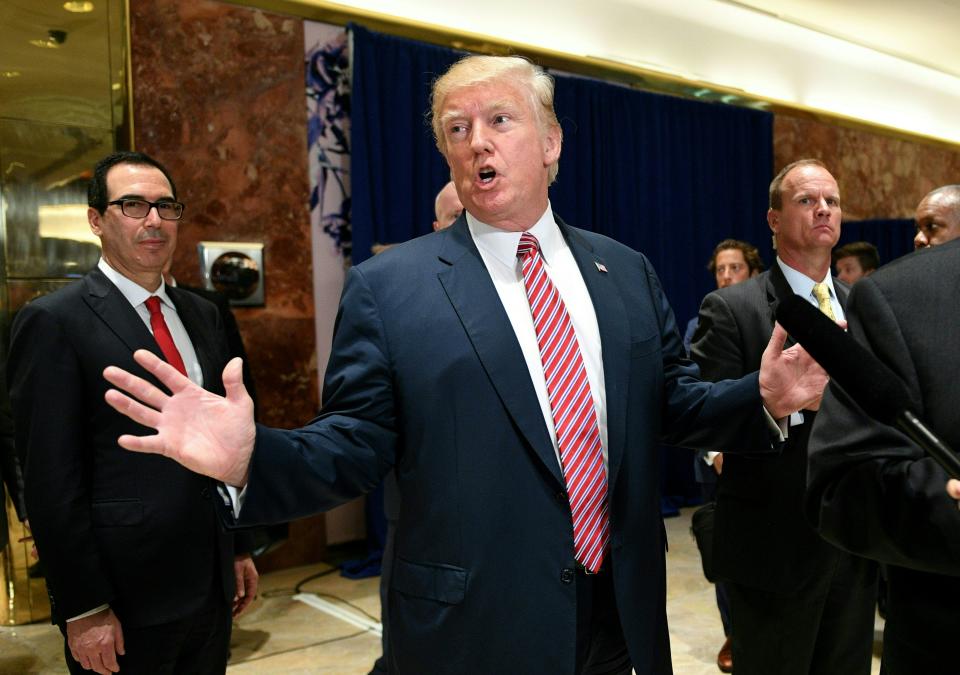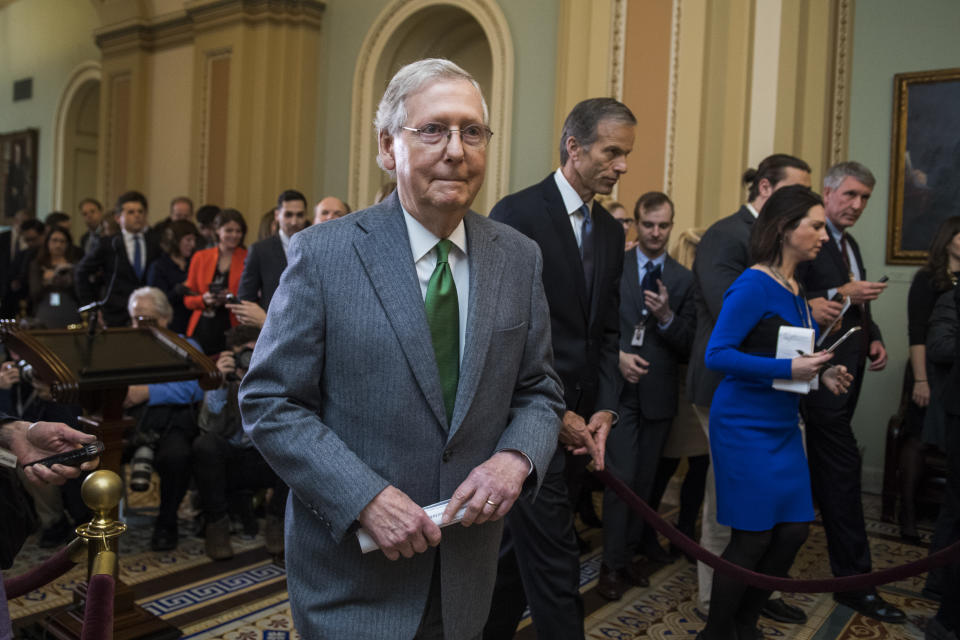Chaos behind them, chaos ahead, Republicans savor a moment of triumph
WASHINGTON — Paul Ryan, as 2017 wound down, looked like a man who had dodged a meteor strike.
The Republican House speaker from Wisconsin, in fact, looked like a man who had been relieved of a great weight at his weekly press conference in the final days of his party’s push to pass a massive tax cut through Congress.
He probably couldn’t imagine how it would feel to maneuver a big piece of legislation to the finish line. Most days were consumed with the tweet-inspired chaos that has become the norm in Donald Trump’s Washington.
And yet there Ryan was, on the verge of a tax bill and talking about entitlement reform in 2018.

Changes to Medicare and Social Security might be a political fantasy, but the fact that Ryan was even discussing it had to feel good for the 47-year-old speaker. Substantive tax and entitlement reform have been his top goals since he arrived in Congress in 1999.
And while only the corporate tax cuts are permanent, it’s better than the worst-case scenario that many Republicans like Ryan have feared about the Trump presidency.
The republic still stands. Republicans, however, are tottering.
Election results in Virginia and Alabama suggest that a massive wave is building in favor of the Democrats that could eliminate the GOP’s 24-seat majority and give Democrats control of the lower chamber of Congress.
And even though a Ryan confidante bristled at rumors that the speaker would retire after 2018, a Democratic majority would very likely give Ryan all the reason he needed to check out of a job he never wanted in the first place.
Republicans will end the year on a high note, after passing the tax-cut legislation. But their jubilation springs largely from relief that they have put a Band-Aid on what was otherwise a dismal first year for Trump and their party. To have ended the year with no legislative accomplishments, despite control of both the House and Senate, would have been an unthinkable embarrassment.

If the GOP had failed at tax cuts, Trump’s only big win in his first year would have been the appointment of Neil Gorsuch to the Supreme Court. But Trump did nothing to make that happen other than simply assent. Senate Majority Leader Mitch McConnell, R-Ky., made the appointment possible, and conservative groups like the Federalist Society hand-delivered Gorsuch to Trump.
As a whole, Trump’s first year was a debacle. It began with the ham-handed rollout of a travel ban. Trump soon thereafter badly damaged his own fortunes by firing FBI Director James Comey, leading to the appointment of special counsel Robert Mueller to investigate collusion between the Trump campaign and Russian operatives in the 2016 election.
The president spooked Americans throughout the year with bellicose rhetoric about North Korea. His unpredictable and often counterproductive public statements were. They did finally manage to put a provision in the tax bill repealing the individual mandate.
The late summer was dominated by Trump’s jaw-dropping response to the white supremacist rallies and violence in Charlottesville, and his feud with NFL players and owners over demonstrations by black athletes protesting racial injustice.

Democratic victories in Virginia’s legislative and gubernatorial races, followed by the first election of a Democrat to statewide office in Alabama since 1981, delivered a simple message: Republicans, your time is running short.
So, when it came to the tax bill, anything was better than nothing.
Trump has made a few moves praised even by conservatives who opposed his candidacy. National Review’s Rich Lowry lauded Trump’s “imperviousness to polite opinion” that animated the U.S. withdrawal from the Paris Agreement on climate change, declaring Jerusalem the capital of Israel and decertifying the Iran deal.
And even Democrats have acknowledged the Trump administration has had success in pushing judicial nominations to the federal bench through the Senate.
But 2018 looks like a minefield for the GOP.
Their tax victory might be short-lived and even, as the Washington Post’s James Hohmann called it, “pyrrhic.” It is already deeply unpopular in public opinion polls, which reveal that most Americans see it as a giveaway to the rich that will do little for working Americans and only make inequality worse.
By ending Obamacare’s individual mandate, the GOP is taking responsibility for likely increases in health insurance premiums, and putting the onus on themselves to find a fix.
Many Republicans expect Mueller’s investigation to result in indictments of high-level White House officials — if Trump doesn’t trigger a constitutional crisis by attempting to fire the special counsel. And if indictments are brought, one well-connected GOP operative said recently that the word “unhinged” wouldn’t begin to describe how Trump would behave then.
Consider the uncharted realms of presidential behavior the country may experience if Democrats recapture the House and the Senate, and begin drafting articles of impeachment.

And lawmakers themselves are being held to account in the ongoing reckoning over sexual misconduct and harassment. Rumors are swirling that dozens of members of Congress could be implicated over the coming weeks and months.
Then there is Trump’s repugnance to large numbers of American voters. He began his first year as president with the lowest approval rating — 44 percent — of any American president since Gallup began keeping track of the statistic during the Truman presidency. After one year, he is at 35 percent approval, the same level Richard Nixon found himself as the Watergate scandal picked up steam in 1973.
“The argument grows increasingly plausible that no one is doing more to restore the health and vitality of American liberalism than Donald Trump,” historian Niall Ferguson wrote.
The Trump effect is likely to create a surge to the polls in 2018 and 2020 that could outpace recent wave elections, including Democratic wins in 2006 and 2008 in response to the Iraq War and the Republican victories in 2010 in reaction to Obamacare.
Increasingly wild swings are a bad sign in financial markets, and they are also a sign of ill health in a nation’s politics.
Ultimately, while 2017 will be remembered as a year in which institutions like the press and the judiciary reasserted themselves, the Republican leadership and majorities will have neglected an opportunity to move Congress in a more sustainable, bipartisan direction.
“Chaos,” McConnell said in 2014, is “entirely predictable … if you approach legislation without regard for the views of the other side.” He was criticizing Obama and the Democrats for their approach to the health care fight in 2009 and 2010. And while many Democrats disagree with McConnell’s characterization, there is a strong argument that he was right then.

But on Gorsuch and health care and taxes, Republicans did exactly what McConnell said would destabilize America. The result was short-term wins that widened the cracks in the foundations of our political institutions like the Senate and the norms that hold our representative republic together.
America is still looking for leaders with the courage to sacrifice immediate gains for their side in favor of the interest of the country as a whole.
_____
Best of 2017 Yahoo News Features




